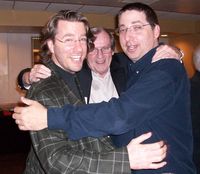 My friend, the huggable spy, Barry Eisler has announced that he's walking away from a $500,000 advance from St. Martin's Press to self-publish his books. Eisler explains his thinking in a long and fascinating interview with — who else? — his buddy Joe Konrath:
My friend, the huggable spy, Barry Eisler has announced that he's walking away from a $500,000 advance from St. Martin's Press to self-publish his books. Eisler explains his thinking in a long and fascinating interview with — who else? — his buddy Joe Konrath:
I know it’ll seem crazy to a lot of people, but based on what’s happening in the industry, and based on the kind of experience writers like you are having in self-publishing, I think I can do better in the long term on my own.[…]I’m not the first example, though I might be a noteworthy one because of the numbers I’m walking away from. But there will be others, more and more of them.
He's right. Just a few weeks ago, Terrill Lee Lankford made headlines by rejecting a high, five-figure deal. By now, the publishers must be doing so much head-scratching that they have no scalps left.
But the reason established authors are doing the previously unthinkable — saying no to big-money advances — is simple. In exchange for that advance, the publisher is, essentially, buying the book out-right and forever (since it's unlikely to ever go "out of print" with the advent of ebooks) and yet are only offering a 25% royalty on ebooks.
But ebooks cost almost nothing to produce. There's no printing, no warehousing, no distribution. The only costs are editing, formatting, and cover art. So why give authors so little? The truth is, what the author will get is even less than 25%, as Barry and Joe explain:
Barry: […] a 25% royalty on the net revenue produced by an ebook equals 17.5% of the retail price after Amazon takes its 30% cut, and 14.9% after the agent takes 15% of the 17.5%.
Joe: Yeah, that 25% figure you see in contracts is really misleading. Amazing, when you consider that there’s virtually no cost to creating ebooks–no cost for paper, no shipping charges, no warehousing. No cut for Ingram or Baker & Taylor. Yet they're keeping 52.5% of the list price and offering only 17.5% to the author. It’s not fair and it’s not sustainable.
Which is why we are going to see more and more A, B and certainly C-list writers opting to forgo publishing contracts in favor of self-publishing.
Where does this leave print publishers? Domestic print publication will become for an authors a nice ancillary market, much the way audio and foreign editions are now, where limited rights are sold for a negotiated fee. The benefits would be distribution to brick-and-mortar stores (those that are still left). Or perhaps, as one blogger predicted, a retailer like WalMart or B&N might make exclusive deals with authors to sell the print editions in their stores.
But even in that negotiation, authors will have strong, self-publishing alternatives to help them leverage the best possible deal.
I found that out for myself this weekend. I was astonished to find the CreateSpace print editions of my self-published ebooks available for sale at the Virginia Festival of the Book alongside my Penguin-published MONK books…and being gobbled up by readers.
The readers saw no difference between my self-published novels and my published ones (granted, I hired a professional cover artist and formatters, so they looked very slick). But I am seeing a difference: much higher royalties and more money in my pocket. And if I, a mere mid-list author, is seeing that, imagine how much better a guy like Barry could do.
But you won't have to imagine it. Soon you will be able to see it for yourself. Barry's new John Rain novel, The Detachment, will be self-published by Father’s Day. My prediction — it will be a huge Kindle bestseller.

Lee, can you give us some idea of how much formatting is costing you? I’m hoping to get some rights back soon to some of my books and put them out as e-books, but I was planning to just upload them via the Kindle Direct Publishing page. On the other hand, I am getting a professional graphic artist to create covers for me.
Yeah, I referred to you guys in my blog post today: The 4 Horsemen of the Apocalypse: JA Konrath, Barry Eisler, Amanda Hocking and Lee Goldberg.
Nathan Bransford has several posts on this with breakdowns of how much an ebook actually costs publishers to produce.
http://blog.nathanbransford.com/2010/02/what-should-e-book-cost.html
I’m happy that Barry took the Indie route. He already has an international fan base. If he even sold half as many copies of The Detachment as Inside Out, I have no doubt that he’d earn well over $500,000 in 1-2 years. I can’t wait for it.
Russell Brooks
Author of Pandora’s Succession
I just read that Amanda Hocking signed a $1 million deal with a traditional publisher. If ebook self-pubbing is the be all and end all for writers, then why is she suddenly going in the opposite direction?
Barry Eisler will make more money on ebooks by self-publishing, but what about all the lost sales of the paper edition? More than 90% of books sold are still paper editions.
Great article. I was out of the market for a while and spent time posting my extensive backlist. Then I wrote an E-specific book and it’s doing great. I’m going to keep going until publishers cut a better deal on teh E-rights. Nice to be in a growing club!
There are good reasons for going solo. The biggest amongst them is ALREADY HAVING AN ESTABLISHED FAN BASE. Yes, yes, yes, Amanda Hocking – but using outliers like that to tell new writers that it’s better to go indie than to go trad is pretty much the same as using J K Rowling to support the opposite prediction. Sure, some strike it rich. MOST DO NOT. Hocking herself said as much on her blog. And dear GOD, if I were offered an advance of $1mil by a trad publisher – even if it comes in the usual chunks of chopped up bits and pieces – I’d leap at it. You MIGHT get a quarter of a million dollars from the sale of your self-published novel – or you might not. But your trad publisher hands over a check for a minimum of that amount when you sign the contract. No contest.
I assume Barry Eisler has a significant following. How many books are on Amazon now–a million and a half? I know his following will help, but isn’t there a serious danger even with a great cover and plot summary of simply falling into the abyss?
Lee:
With things like this going on, I’m curious about a couple things:
1. Do you still think new writers should get a “regular” publishing deal, or are you starting to change your mind?
2. What are your thoughts on pricing? I just read this:
http://allindiepublishing.com/author-interviews/zoe-winters-on-ebook-pricing/
I thought it was an interesting premise, but I felt like it lacked data.
There is a lot of buzz on this and rightly so. This may be the point where the big houses actually get their wake up call. I don’t know what they will eventually change their business model – or not survive, but I don’t know what that new model will be.
Perhaps the new world will be new authors are published in the traditional houses as best sellers take their readers and go to self publishing.
Whatever happens, it’s a fun time to be a writer.
Something I just thought of – what does this do to the traditional industry awards, of which the Edgar is the most prominent? Most of these explicitly prohibit self-published books. As more and more authors go the self-pub route, I wonder if that will change.
I’m for Team Barry. I totally think he did the right thing, and I can’t wait to buy his book on release day.